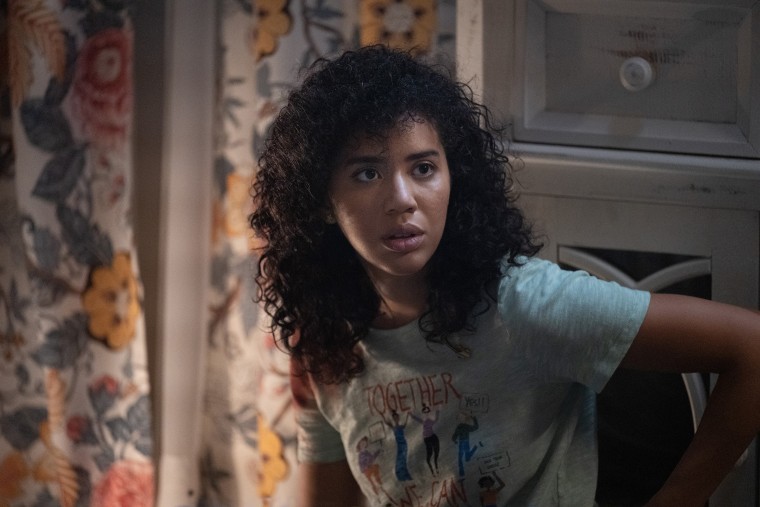After working in Hollywood for nearly a decade, actor Jasmin Savoy Brown is finally standing proudly in her queerness — and putting it front and center in her work.
In the hit Showtime series “Yellowjackets,” which premiered in November, Brown plays Taissa, a queer 17-year-old soccer star who becomes a high-profile politician. And just this week, along with fellow "Yellowjackets" star Liv Hewson, Brown launched Netflix's first LGBTQ-focused podcast, The Gay Agenda. Next, Brown will make horror history, playing the first queer character in the "Scream" franchise, which releases its fifth installment in theaters Friday.
However, the 27-year-old actor told NBC News her portrayal of LGBTQ people might look different than the queer characters of yesteryear. In other words, she said, they'll be "joyful."
"There's so much tragedy porn, you know? In all of these movies and shows, the gay people die or it's sad about how they came out and their parents abandoned them. No," Brown said. "My life and my friends lives that are queer are so full of joy. We're laughing. We're happy. We're so successful in what we do. That's the kind of queer content I want to hear."

Brown came out to her friends and family when she was about 21 and living in Los Angeles, one of the most LGBTQ-friendly cities in the world. But even there and then, she was a bit "trepidatious" about her sexuality, she said.
"Had I had access to the content that I am creating now when I was younger, I think I would have realized I was queer a lot sooner, come out of the closet a lot sooner and been comfortable in my sexuality sooner," she said. "There's just so much pain around our queerness, and it's taken a lot to get to a place of joy, because we didn't have that many examples that were positive."
Brown added that she thinks creating positive queer content will make LGBTQ people more relatable for straight viewers.
"I hope that people who maybe do or don't have queer people in their life but don't identify that way themselves, that they'll listen to the podcast or see the movie and go, 'Oh ... gays, they're just like us,'" she said with a laugh.
"You know what I mean? Like, nothing different here except we just have better fashion. That's it," she said.
While she's intent on portraying the upsides of being queer, positivity does not come at the cost of her character's substance, she said.
After being cast as Mindy, a queer Black student, in "Scream," Brown said she worked hand in hand with the filmmakers to make her character a "completely lived-in person."
"I’ve seen a lot of queer content where the character feels half-baked, and it’s such a rip-off and it makes me feel sad and used, as if we’re props," Brown explained. "I just wanted to really make sure we went fully in the opposite direction, had a completely lived-in person who isn’t defined by her queerness, but her queerness is celebrated even in the nuances."
“It’s subtle changes that really make a difference and me as an audience member feel seen when I’m watching something. It’s the showing versus saying. It’s the doing versus alluding to,” Brown added.
Even the "little things," such as Mindy's wardrobe and accessories, were built into her character with a queer eye, Brown said.
"I was like, 'Well she has to wear a watch because gays love a watch,' you know? Stuff like that," she said.
Through making The Gay Agenda podcast, which will follow the lives of the world's top LGBTQ creatives through a comical lens, Brown also aims to bring uplifting queer content to Netflix.
But her podcast's premiere follows a chorus of criticism the company received from the LGBTQ community regarding Dave Chappelle's special "The Closer."
The special, which premiered on the streaming service in October, was rebuked for including transphobic and homophobic content, prompting worker protests and resignations at the streaming giant.
Brown said the Chappelle controversy was "frustrating" because "there is a place for jokes that make people uncomfortable because it makes them think" but not "because they're mean."
"It was really painful to a lot of people in a lot of various communities, and I'm sorry. I'm sorry for that. I wasn't the one doing the special, but I do work at Netflix and I hope that Netflix will continue to support voices like mine and Liv Hewson's, who are all about calling in rather than calling out," Brown said.
When asked to weigh in on the simmering debate about whether straight and cisgender actors should play gay or transgender characters in film and on television, Brown said she has mixed feelings.
"If there was more access for queer actors in general to play roles, whether that be queer roles or straight roles, I’d be totally fine with it because we are acting and it is about telling a story. There’s so many lives I’ve never lived that I am portraying on screen. If we get to the specifics, should I not play a soccer star because I’m not a soccer star?" she said, referring to her character in "Yellowjackets."
“But the reason it’s problematic, it’s because often the straight actor is deferred to over the queer actor — whether it’s for a queer role or a straight role — similar to how there’s still so many more roles for white people than there are for people of color,” she added. “Once it’s balanced out more, I don’t think there’s a problem with it.”
